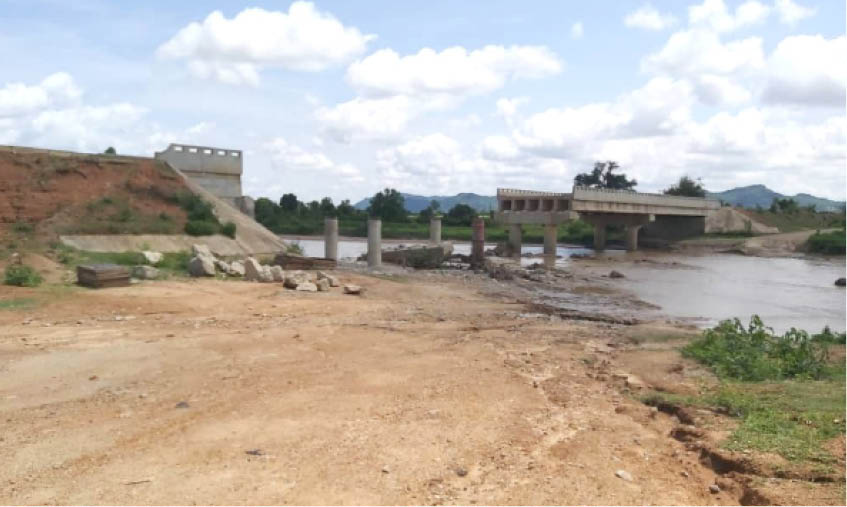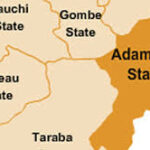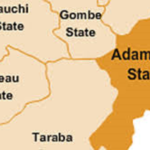Kuzum, Dilichim and Wuro Gayandi bridges are currently the nightmare of travellers along the highway that connects the central parts of Adamawa State with the north, as well as Borno State.
A queue of cars wait impatiently at both ends of the narrow colonial-era bridge and then, start crossing, one at a time, while tensed looking passengers say their prayers as the car makes its way along the narrow bridge suspended in the air by rusty metals amid noisy clanking sound of wood and metal.
- Agency, institution to teach Gombe, Adamawa kids on radio
- COVID-19: Adamawa govt, USAID launch schooling via radio
Trucks and other heavy-duty vehicles cannot pass through the precarious contraption. The scary colonial bridge abandoned for decades is being put to use again following the destruction of the modern concrete Kuzum bridge by the Boko Haram insurgents.
Crossing Dilichim and Wuro Gayandi bridges is a bit tricky because motorists drive on a sand-filled path across the river. The bridge is a pile of sand susceptible to being washed away by running water whenever it rains.
The structures were destroyed at the height of Boko Haram insurgency in 2014 when the insurgents took over control of seven local government areas and threatened several others in the state. With the coming of President Muhammadu Buhari’s government, contract for the rehabilitation of the structures was awarded to RHAS Nigeria Ltd.
“Crossing Dilichim temporary bridge was the worst moment for me. I was travelling from Yola to Shuwa in Madagali. We managed to cross Kuzum but crossing Dilichim became a problem because it just started raining when we were in the middle of the bridge. Strong water current washed away the bridge and we were all confused. Luckily, the driver managed to make it. We could have drowned,” a businessman who plies the road told Daily Trust Saturday.
Local communities in Michika and Madagali have been facing a hard time since the collapse of the three major bridges linking them with the state capital. Motorists conveying people and goods have difficulty crossing the rivers, especially in the rainy season.
Neither the government nor the local communities are satisfied with the manner the contractor is handling the project awarded by the Federal Government four years ago, with community leaders and politicians criticising the construction firm for failure to mobilise adequate machinery and manpower to the site which remained the way it had been before the commencement of the repairs.
Residents of the local communities interviewed by our reporter expressed frustration over the stalling of the project which started four years ago as part of federal government’s effort to improve infrastructure in the communities ravaged by Boko Haram in northeast Nigeria.
Maikudi Uba, a commercial driver who plies the Yola- Madagali route, lamented the difficulty motorists encounter at the bridges, saying crossing them takes unnecessarily long time, adding that some passengers often abandon their trips to avoid the hardship and traumatic experience encountered at the affected bridges.
“This construction company cannot do this job in ten years. They are too slow,” Maikudi complained.

Aliyu Hamma, a resident of Yola who attended his brother’s burial in Madagali recently, while narrating his ordeal to Daily Trust Saturday, said he was terrified while crossing the temporary bridge that was made with sand at Dilchim.
“President Buhari ought to have revoked this contract because the contractor is a total failure. For four years, no progress has been made. This is enough to tell the president that this company is incompetent and cannot execute the job,” he stated.
At the peak of rainy season in August 2019, Adamawa State governor, Ahmadu Umaru Fintiri, berated the contractor during a visit to Dilichim project site after rainfall washed away the bridge, cutting away hundred of communities and rendering travellers stranded along the highway.
The governor accused the contractor of incompetence and lack of capacity to execute such a project, calling on the federal government to revoke the contract and re-award it to another company for speedy execution of the repairs.
He lamented that the situation had slowed down businesses in the area known for robust economic activities, noting that the economic loss caused by the attitude of the construction company was enormous. The governor had reportedly made several trips to Abuja to follow up the matter with the relevant federal government agencies.
Speaking on behalf of the contractor, the site engineer for Dilichim Bridge, Joshua Yakubu, had said the delay was necessitated by activities of insurgents in the area, urging the local communities to exercise patience as the company was committed to the completion of the project as soon as possible.
Soon afterwards, the contractor returned to site and worked for sometime, erecting some concrete pillars and then disappeared, attracting public outage as the rainy season set in. Locals have to swim across the rivers to go about their daily activities.
The Michika Local Government council chairman, Michael Shehu, said with the stalling of the bridge rehabilitation project, locals and travellers had to use risky temporary structures to cross the rivers. He appealed to the federal authorities to call the contractor to order for speedy completion of the repairs and to ameliorate the hardship the locals have been subjected to.
“If not for temporary measures taken, we would have been cut off completely and Michika is a business area. The temporary bridge is rehabilitated from time to time. A temporary one is made using sand which means a particular place is blocked to allow people cross but when it rains, the water washes it away. Sometime in August last year, the bridge collapsed and people were cut off for two days. The governor was here with officials from the North East Development Commission (NEDC). I have seen commitment from the side of the governor,” Shehu noted.
“The contactor has left the site. We are calling on federal government to take a decisive action. You can see, at Dilichim, people are using a temporary bridge made with sand. As for Kuzum, the old bridge constructed in the 1950s is used as a temporary measure. Trucks cannot pass and they go round through Mubi and join the road after Kuzum which is longer and costlier,” he added.

 Join Daily Trust WhatsApp Community For Quick Access To News and Happenings Around You.
Join Daily Trust WhatsApp Community For Quick Access To News and Happenings Around You.


